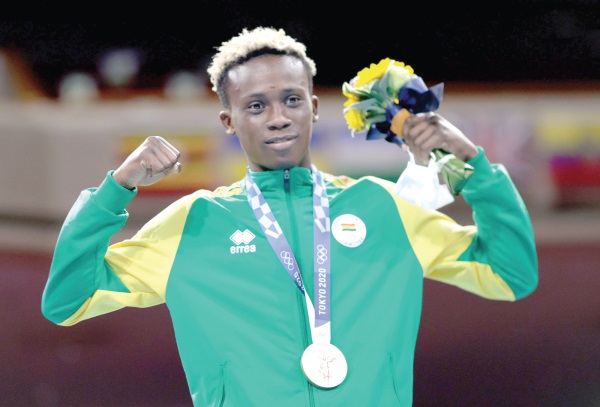
Complex currency, value of Olympic medals
As Paris gears up to host the 2024 Olympic Games, the world's attention is drawn not only to the thrill of competition but also to the evolving discourse surrounding the value of Olympic medals.
These cherished symbols of athletic prowess have sparked debates about their monetary worth and the deeper significance they hold in the annals of sporting history.
In contemplating the hypothetical scenario of Usain Bolt replicating his iconic Beijing 2008 Olympic victories in Paris, the question arises: What price could one attach to the three gold medals earned by the Jamaican sprinting legend? Conversely, do the historic achievements of Jesse Owens at the 1936 Berlin Games carry more weight than any monetary appraisal could quantify?
Turning to Ghana's journey in the Olympic arena since its debut as the Gold Coast in 1952, Ghanaian athletes and teams have clinched six Olympic medals, each representing a chapter in the nation's sporting narrative. From Clement 'Ike' Quartey's ground-breaking silver in boxing at the 1960 Rome Olympics to the Black
Meteors' historic football bronze in Barcelona 1992, these medals bear witness to important triumphs and struggles of the athletes on the global stage. Can the monetary value assigned to these medals truly encapsulate their significance in sporting history?
The allure of Olympic success is undeniable, with athletes worldwide dedicating their lives to the pursuit of a dream – the opportunity to compete on the grandest stage of them all.
Last week, track and field's international governing body, announced a revolutionary plan to pay $50,000 in bonus to each gold medal-winning athlete in the 48 track and field events at the Paris Games. The President of World Athletics, Sebastian Coe, defends the move as a means of recognising athletes' efforts.
However, critics warn of potential repercussions, fearing a shift towards a pay-for-play model that could undermine the purity of Olympic competition.
The debate extends beyond track and field, raising broader questions about the commercialisation of sports and its impact on the Olympic ethos.
The ground-breaking move will be a departure from 128 years of Olympic tradition strongly championed by Pierre de Coubertin, the father of the modern Olympic Games, who once warned against the “spirit of gain and professionalism” and that professionalism essentially threatened the Olympics’ existence.
Against the grain
The plan by World Athletics has been move logically welcomed by many elite track and field stars, including the iconic Carl Lewis (now retired), but many fear it would take away the real value of an Olympic gold medal, one of sport's most treasured rewards, and even set a precedent that would eventually take away the very essence of athletes working years just to win an Olympic medal.
It has wider implications for the future than maybe envisaged now; it threatens to put pressure on other international federations that may not be very financially sound to offer medal bonuses to their athletes, and possibly turn the purest sporting extravaganza into a pay-for-play competition.
Within the Olympic community, the latest move is rattling purists who fear a potential eroding of the spirit of the Olympic Games and the beautiful sight of equality in sport where a fencing gold medal, an equestrian gold medal, a football gold medal and a 100m gold are all worth the same.
With the precedent set by World Athletics, the main drivers and rewards of athletic brilliance could be purely material — bonuses, prize money and medals — and may tragically set up different values across different sports.
The Olympic Movement has long upheld the principle of amateurism, but shifts in societal norms and economic realities have prompted reconsideration.
Until 1986, the IOC’s Olympic Charter restricted athletes competing in global events to amateurs, which meant they were barred from making money through sports.
The 1992 Barcelona Olympics, epitomised by the inclusion of the star-studded American basketball players such as Michael Jordan, Earvin 'Magic' Johnson, Charles Barkley, Patrick Ewing and others in the "Dream Team", marked a watershed moment in this evolution, challenging traditional notions of amateur status and paving the way for a more inclusive approach to Olympic participation.
The Olympics have essentially been about outstanding athletic performance, incredible spectator experiences, and as a platform to promote social inclusion and upholding wholesome values about sports.
Yet, as the allure of monetary rewards looms large, concerns mount about the integrity of Olympic competition. Will the pursuit of prize money, rising athlete power and sponsors influence overshadow the intrinsic values of excellence, respect, and friendship that lie at the heart of the Olympic Games?
The monetisation of sports prizes presents a delicate balance – offering opportunities for athletes while risking the commodification of Olympic glory.
The potential ramifications extend beyond the realm of sport, with the possibility of boycotts or breakaway competitions threatening to undermine the unity and spirit of the Olympic Movement.
Ultimately, the true worth of Olympic medals transcends monetary appraisal. They represent the culmination of years of dedication, sacrifice and unwavering determination – a testament to the indomitable spirit of the human athlete.
